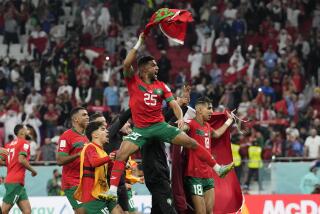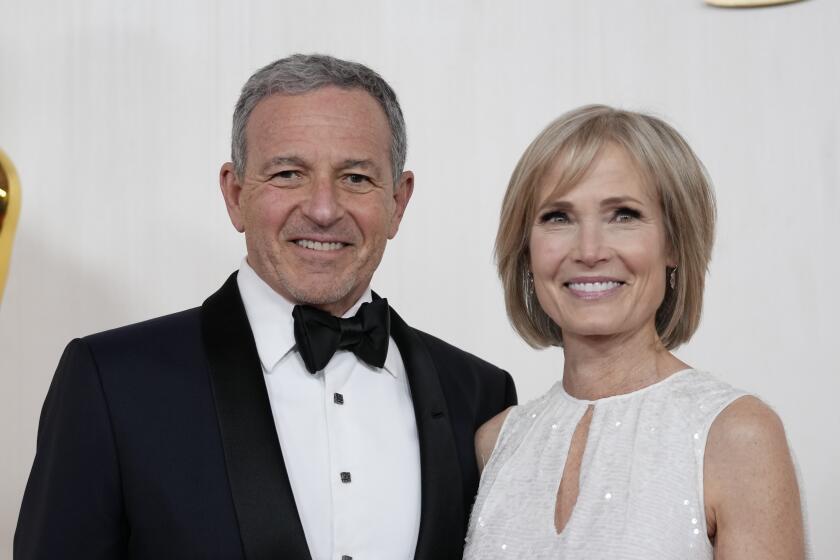World Cup â94 : WORLD CUP USA â94 / GROUP D PREVIEW : New King of Africa : Nigeria Is Best of Continent--and Might Soon Be One of the Best in the World
While teams such as Brazil, Italy and the Netherlands are coming to America with the intention of succeeding Germany as champion, others no doubt would be satisfied to become recognized as the Cameroon of the 1994 World Cup.
How the sportâs followers did rhapsodize! Exciting, entertaining, exhibitors of great promise for the future, they said of the 1990 Indomitable Lions.
Even Cameroon, which appears to have fallen into the morass that is swallowing the entire country, again would like to be found worthy of those descriptions. This time, however, they are more likely to fit its African neighbor--the Super Eagles of Nigeria.
Africaâs most populous nation long has been considered a sleeping giant in soccer, but it woke up to qualify for the World Cup, then reinforced its position as the continentâs new power by winning Africaâs Nations Cup in May.
Much credit belongs to Coach Clemens Westerhof, an embattled Dutchman who was arrogant enough to take on the countryâs politicized sports administration and emerge a hero.
If there was any doubt before about whether Westerhof was in charge of Nigeriaâs World Cup effort, there was none after the final qualifying game last October against Algeria. When the president of the Nigerian Sports Commission, Chief Alex Akiyele, attempted to enter the dressing room at halftime to discuss strategy with the Super Eagles, Westerhof called him a comedian and locked him out.
Exhibiting no sense of humor, Akiyele called a special meeting of the federation to fire the coach, accusing him of offering illegal cash bonuses to his players. But, considering that Westerhof had led Nigeria to its first World Cup berth with a tie in Algiers, the chief had less chance of succeeding than if he had tried to part the Niger River.
âIt was a dream come true, the fulfillment of a national goal and the crowning of Nigeriaâs soccer history,â a Nigerian newspaper, the Daily Champion, said the day after the team had qualified.
Five months later, exclamation points were added. When Westerhofâs team won the Nations Cup for the first time since 1980, the question no longer was whether he could keep his job but which job in Nigeria he wanted.
Dictator presumably was the only one beyond his grasp. Nigeriaâs military ruler, Gen. Sani Abacha, does not allow challenges.
No one was more aware that Westerhof and his team had provided a welcome diversion from the countryâs political and economic turmoil than Abacha, who sought to capitalize by establishing himself as the teamâs No. 1 fan. On the day before the Nations Cup final in Tunisia, he spoke to the team for an hour by telephone from Lagos, an address that later was replayed to millions of Nigerians on state television.
When the Super Eagles beat Zambia, 2-1, the next day for the championship, it was a signal to many within the soccer world that players from the countryâs long-successful youth program had come of age and that Nigeria soon would dominate the continent.
Some even predicted that Nigeria in the perhaps not-so-distant future would become the first African team to win the World Cup. The only African team that has reached as far as the quarterfinals was Cameroon in 1990.
With more than 40 players active in European professional leagues, Nigeria certainly has more depth than Cameroon, leading Westerhof to boast he had three quality players for every position.
âWeâve proven weâre a good side, with great individual players,â forward Victor Ikpeba said. âThere is so much talent, we could form two different sides and still be the best in Africa.â
For example, with star striker Rashidi Yekini tiring after scoring five goals in the first four games of the Nations Cup, Emmanuel Amunike made his tournament debut in the championship game and scored both goals in the victory over Zambia.
Yekini, 30, is a superb finisher, scoring eight of Nigeriaâs 17 goals in the World Cup qualifying rounds. Also known for his bluntness, a frequent target of his broadsides is Westerhof.
This team is better than Cameroonâs of â90, as explosive on offense and less likely to implode on defense. But Nigerians are even more optimistic about the future. After winning the world youth championship in 1985 and finishing second two years later, the Nigerians proved their under-17 players are still among the worldâs best by winning again last year. Assistant coach Fanny Ikhayere Amun said recently he is convinced the Super Eagles will be contenders for the World Cup title by 2002.








